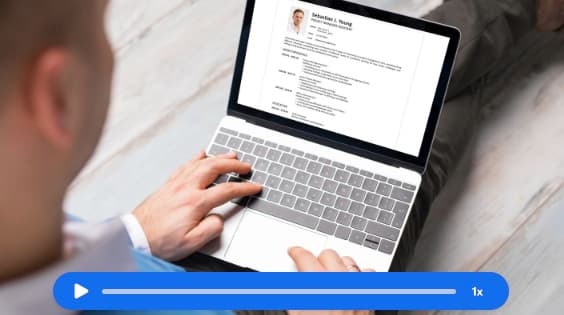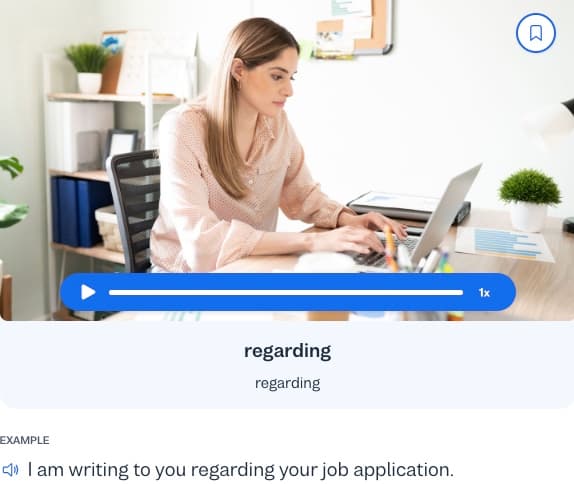I want to learn...
Author:

Barney Meekin
Writing an effective CV in English can mean the difference between getting the job you want and missing out. Your CV is the first step in the hiring process. A well-written CV makes a great first impression, increasing your chances of getting an interview.
But if English isn’t your first language, writing a CV can be a challenge. Writing in English is tough on its own, but CVs also have a unique format with complicated cultural rules that may be different from those in your home country. This combination makes writing a CV one of the hardest writing tasks.
But don’t worry — we’ve got you covered. In this guide, you’ll learn how to write an effective CV in English to improve your employment chances.
Why you need a good English CV
Your CV is the first impression you make on a potential employer. It’s the first chance you get to show off your qualifications, skills and experience. A well-written CV convinces people that you deserve an interview. A poorly-written CV is put in the rubbish bin.
So if you want to impress people with your skills and experience, a good CV is non-negotiable. Unfortunately, as a language learner, that might be trickier for you. Maybe you’re not confident in your English vocabulary and written skills yet. Or you’re unsure about the format and customs of English CVs. Or you’re worried about how to apply your language skills effectively.
Well, fear not — writing a CV in English is actually much less scary than it sounds. And if you follow the tips in this guide, you’ll be able to create a fantastic English CV that shows off all your strengths.
Note: I’ll use the words CV and resume throughout this article to mean the same thing — a short document showing your skills and experience. CV is the UK word, and resume is the US word. A CV in the US is a long document with lots of details, and we won’t be covering it in this article.
How to write a winning English resume
Let’s get to it. Here are seven tips that will help you master English CV writing and give you the best possible chance of progressing through the hiring process.
1. Include these key sections
An English CV must include the following sections:
Contact information: This includes your name, email address, and phone number. Stick this right at the top of the page.
Summary: Write a brief overview of your important skills and qualifications. This shouldn’t be long — stick to two or three sentences. The aim is to show the reader why you would be perfect for the job without going into too much detail.
Work experience: List your previous jobs (starting with the most recent). Add the company, your position, and the start and end dates. Also, list your responsibilities and achievements at each job.
Education: List your academic degrees and certificates (starting with the most recent). Include information about where and what you studied, when you graduated, and what qualifications you have. And because you’re a non-native English speaker, add your English study background and qualifications here to let employers know about your English skills.
Skills: List your relevant skills. You can add both technical and soft skills (things like communication, teamwork, and time management).
Every good resume will have the above sections. You can also include the sections listed below, but you don’t have to — and if your CV is getting too long, leave or cut these sections out. These sections include details that may not be super important or relevant to the job you’re applying for, but they add extra information about you.
Achievements: List accomplishments or awards that show your abilities.
Volunteer work: Include unpaid experiences that show your skills and values.
Languages: This is a list of the languages you speak and your proficiency level.
Interests: These include hobbies or activities that show your personality.
2. Tailor your English resume to the job
The best CVs are specific to the job you’re applying for. Recruiters and hiring managers are busy people, and they may have hundreds of CVs to read. So aim to give them as much relevant information as possible. The easier it is for them to see that you’d be great for the job, the more likely they’ll be to invite you for an interview.
Here’s how to customize your CV for each job and company:
Research the company and job
Learn about the company. Research its industry, products, mission, culture and values. Then study the job description. Identify the key skills and experiences the company is looking for.
Match your resume to the job description
You need to reflect the information you found in your research in your CV. Make sure you do the following:
Highlight your skills and experience that directly relate to the job description.
Add keywords from the job description to your summary and work experience sections.
Include achievements and experiences that you think match the company’s needs. Show them that you can help them achieve their goals.
Try to match the tone and language of your CV with the company’s culture and mission. Look at their online presence and content to check for this.
Match your CV with the job type or industry. If you're applying for an IT position, for example, technical skills and experience with software are key. But if you’re looking for customer service work, soft skills like communication and experience resolving customer issues are more important.
Check local customs
In some countries, it’s common to add a personal photo, your age, marital status and home address. In other countries, it’s illegal for companies to request that information. Be sure to check what you need to include on your CV.
3. Highlight your English skills effectively
You need to show the hiring people that your English is good enough. In your education or skills sections, list your English level and qualifications.
When you add your English level to your CV, use a standard framework like the CEFR (or the ACTFL if you’re applying to a US company). You also need to back up this claim with evidence from tests like the TOEFL or IELTS. If you do this, people who read your resume will have no doubt that your English is good enough for the job.
For more tips and detailed information, read our guide to adding language skills to your resume.
4. Be clear and concise
Hiring managers and recruiters don’t have time to read a novel of a CV. So avoid long sentences, paragraphs and descriptions. The aim is to write in clear English that gets straight to the point. Here are some tips:
Use bullet points. Make your CV easy to read by adding bullet lists to your work, education and skills sections.
Start each bullet point with a verb. Strong action words have impact. Think of verbs that show how you contributed to success at your previous job.
Focus on achievements. Don’t just list your responsibilities. Try to highlight the results of your work.
Keep it simple. Forget long and complicated sentences. And don’t include fancy words. Keep it simple and easy to read.
Add white space. Huge walls of text are difficult to read. So break them up with spaces, short paragraphs and lists. Leaving white space on the page makes it easier to read.
Be concise. Try to fit your CV on one or two sheets of A4 paper. Respect the time of the hiring managers and keep it short. This means you should only include the information most relevant to the company and position.
5. Proofread and edit your resume carefully
Mistakes on a CV are a quick way to ruin your chances of getting an interview. You must proofread and edit before you hit send. Here are some steps to take:
Check the formatting. Check that your font, font size and spacing are the same throughout the document. Make sure you use bold type, italics and bullet points consistently. Formatting mistakes make your CV look unprofessional.
Check for grammar and spelling mistakes. Use spell-check tools to find any errors. And read through your resume carefully to find any mistakes. Doing this on paper can help — print out your resume, grab a highlighter pen and get checking!
Bonus tip: By using simple vocabulary and sentences (as recommended in the previous section), you reduce the chance of mistakes and make your CV easier to read. It’s a win-win!
Check from bottom to top. This will seem strange at first. But start reading your CV at the bottom of the page and work your way up to the top. This helps you spot mistakes. Trust me, this works! I don’t know why it works, but it does.
Check for clarity. Read your CV out loud. When you read silently, it’s easy to miss things like awkward phrasing, run-on sentences, or long, complicated sentences. Reading out loud is a fantastic way to spot these errors.
Here’s a helpful tip: If it’s getting difficult to breathe when reading out loud, your language is too complicated and your sentences are too long.
Create a winning English CV today
Follow the tips in this article, and you’ll be showing your best self to hiring managers. Your CV might be one of hundreds piled up on their desk, so make it stand out by being the clearest and easiest to read. Writing an English resume isn’t an easy task, but it’s worth the hard work because an effective one can make a huge difference to your chances of getting a job.
Here’s a quick summary of the tips we’ve discussed. Remember to only include information relevant to the job and the company. Respect the time of the hiring manager by getting straight to the point. Keep the language simple, fit it on one or two pages of A4 paper, and use white space and bullet lists to make it easy to read.
Follow these tips, and you give yourself the best chance of being invited for an interview.
AUTHOR

Barney Meekin
Newlanguages


